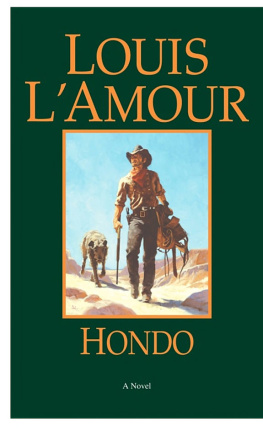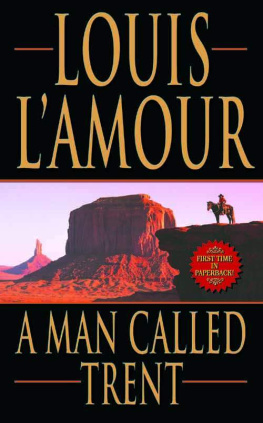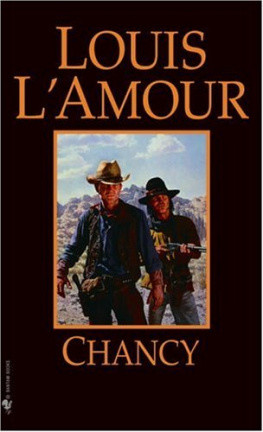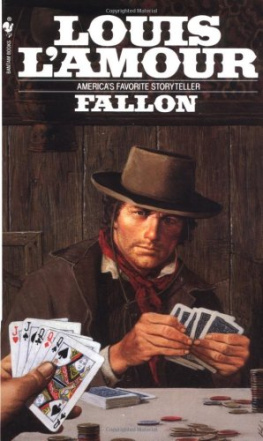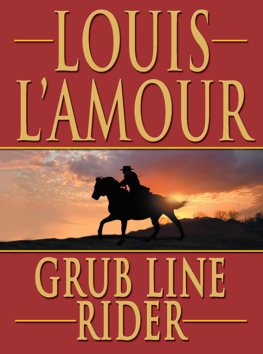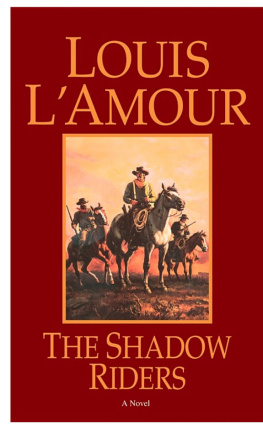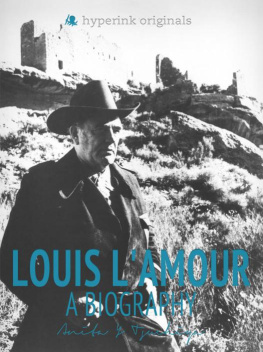Louis LAmour - The Empty Land
Here you can read online Louis LAmour - The Empty Land full text of the book (entire story) in english for free. Download pdf and epub, get meaning, cover and reviews about this ebook. year: 2004, publisher: Bantam, genre: Detective and thriller. Description of the work, (preface) as well as reviews are available. Best literature library LitArk.com created for fans of good reading and offers a wide selection of genres:
Romance novel
Science fiction
Adventure
Detective
Science
History
Home and family
Prose
Art
Politics
Computer
Non-fiction
Religion
Business
Children
Humor
Choose a favorite category and find really read worthwhile books. Enjoy immersion in the world of imagination, feel the emotions of the characters or learn something new for yourself, make an fascinating discovery.

- Book:The Empty Land
- Author:
- Publisher:Bantam
- Genre:
- Year:2004
- Rating:4 / 5
- Favourites:Add to favourites
- Your mark:
- 80
- 1
- 2
- 3
- 4
- 5
The Empty Land: summary, description and annotation
We offer to read an annotation, description, summary or preface (depends on what the author of the book "The Empty Land" wrote himself). If you haven't found the necessary information about the book — write in the comments, we will try to find it.
The Empty Land — read online for free the complete book (whole text) full work
Below is the text of the book, divided by pages. System saving the place of the last page read, allows you to conveniently read the book "The Empty Land" online for free, without having to search again every time where you left off. Put a bookmark, and you can go to the page where you finished reading at any time.
Font size:
Interval:
Bookmark:
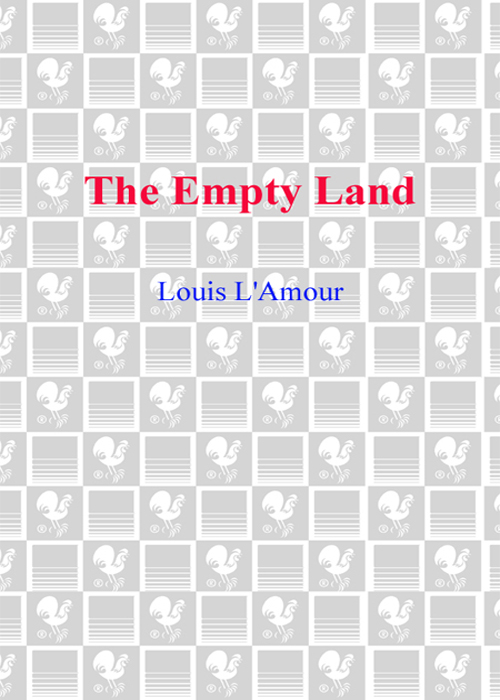
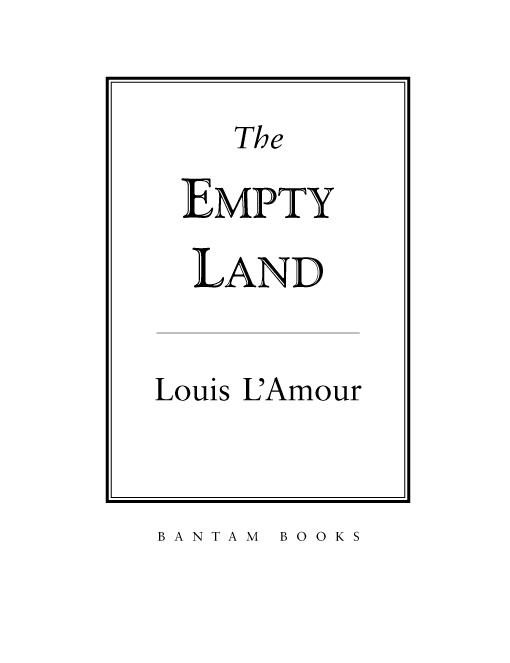
Contents
C OBURNS L AW
F ELTON LOOKED UP at Coburn. What do I do? he asked. I guess its not enough just to walk down there with a badge.
Coburn waited a moment before he spoke.
No, he said finally, it isnt. Not every man can do ityou might be one of them. Id take a shotgun if I were you. Go down there and tell them the law, and the first one who gives you any back talk, just give him the butt of it in his teeth. If he reaches for a gunshoot him.
To My Father
who knew what it meant to wear the badge.
Chapter 1
I N EUROPE, POPE Gregory the Great had died, in Ireland the Golden Age of scholarship was at its height, and on the Continent the Merovingian kings ruled much of what is now Germany and France.
In Southeast Asia the little kingdom of Champa, now called South Vietnam, was locked in a life-and-death struggle for its independence, with China and what is now North Vietnam.
It was the seventh century, and the great Tang dynasty was rising in China, while across the Asian continent a relatively unknown young man named Mohammed sat meditating in Mecca, conceiving the religious teachings that were to dominate civilization for the next seven hundred years.
In what was someday to be known as western Utah, a hungry coyote trotted across a barren slope.
The coyote had no awareness of history beyond the memory of where his food had been obtained in the past, nor had he any realization of the sequence of events he was soon to start in motion, a sequence that was to enrich several men and at least one woman, and was to bring sudden and violent death by bullet or blade to at least forty men.
All of that lay more than eleven hundred years in the future, but it was the coyote that began it.
The desert slope across which the coyote trotted was no different to the eye from a thousand other such slopes, falling steeply away to a boulder-strewn wash that remained dry except after the infrequent rains, when it might run six to eight feet deep with rushing water, only to dwindle away to nothing in an hour or so.
The slope itself was a litter of sand, broken rock, low-growing brush and an occasional juniper.
There was nothing to draw the attention, even less to hold it. There was only the deep green of the junipers against the sand-colored slope, broken here and there by the broken teeth of exposed ledges or outcroppings.
Over the centuries the slope had remained relatively unchanged. A rock rolled here, a cedar sprang up over yonder, a bush died, a passing animal left droppings. The sun and the wind moved over the slope.
The coyote remembered a chipmunk that lived somewhere near the crest. It was a very wily chipmunk, but the coyote was passing his way and might prove luckier than in the past.
Wise in the ways of coyotes, the chipmunk was alert to his coming and, not averse to a little game of tease and tag, waited until the coyote charged, then flipped his tail and ducked into a hole.
Whining with eagerness, the coyote dug at the hole, scattering sand and gravel behind him. Then his claws scraped on rock, uncovering a narrow crack, much too small for a coyote, but perfect for a chipmunk.
Frustrated and furious, the coyote gnawed at the edges of rock, breaking off a few brittle flakes; after that he trotted around behind, searching for another approach, but there was none.
Finally, after much restless pacing and some useless digging, the coyote gave up, deciding the small bite the chipmunk offered was unworthy of so much effort, and he trotted off, pausing only occasionally for a backward glance.
Two months later, it rained. The earth was still loose where the coyote had dug, and the trickle of water off the outcropping came eagerly upon it, filling the hole, then trickling over the edge and starting a tiny stream that hurried down the slope to join the large waters rushing through the wash. The tiny stream carried along with it a small burden of silt and sand, mingled with some minute fragments from the rock, broken off by the teeth of the coyote. When the flash flood ran itself out, the flakes were dropped and left lying to mingle with the sand.
Over the years rains pounded at the slope, and the wind worried it. A juniper seed fell into the crack in the rock, found some slight nourishment, and grew. Water from a late fall rain fell into the crack, a norther froze it, and the expanding ice split the crack still wider. The growing juniper, over the many years, thickened its roots, pushing hard against the rock until it split, and the slab on the downhill side fell, turned over, and lay still.
The inner side of the slab was pressed tightly to the face of the slope. The exposed side, partly covered by the juniper roots, was seamed with bright streaks that ran like jagged lightning through the crumbling quartz.
A hundred years later, another coyote paused in the shade of the juniper, whose boughs now overhung the rock. He nibbled at some of the dry, hard-seeded fruits of the juniper, and rested for a while on the mat of leaves, berries, and shredded bark that had fallen from the tree.
I T WAS IN the fall of 1824 that a trapper crossing the arid slope toward the tree-clad mountains beyond the next valley, made a brief pause in the juniper shade. The dribble of water from the rock had widened the coyote-dug hole into a gully that at the top was several feet deep, and deepened steadily as it cut into the slope. This cut offered a shield for the fire he built to make coffee.
Seated over the dying coals, nursing his cup of coffee, he idly sifted some rocks through his fingers. One fragment threw a tiny gleam into his eyes. Turning it in his fingers, he found the small rock was laced with a golden material.
The trapper had never seen gold except in the wedding ring of his mother, but he pocketed the nugget and forgot it when he moved off next morning.
For nineteen years he carried it for a pocket piece, believing it brought him luck. In 1843 he tossed the nugget into a trunk and settled down to running a tavern in a small Missouri town. He married, built a livery stable at the tavern, and forgot the nugget in the trunk. But within its tiny golden heart lay something explosive and violent, something that lay dormant now, but would one day shatter the Nevada-Utah nights with gunfire.
The trappers tavern and livery stable brought him affluence, his wife brought him a son. In 1849 he supplied gold-seekers bound for California, but cholera swept the plains and he lost his wife and son.
Through all the years of success and sadness he remembered the land he had seen years before. It lived in his mind, and often with eyes closed he felt again the movement of a good horse, the sound of the wind in the grass or the cedars, the running water, the smell of dust and pines and gunpowder.
He remembered a land unpeopled and still, flecked with cloud shadow. He recalled the great red-walled canyons dotted with the deep green of cedar, or the high ridges golden with autumns gift to the aspen. The towering, snowclad hills, the dancing mirage of the desert, the look of a Blackfoots chest in the sights of a long Kentucky rifle, these he could not forget.
Finally he sold the tavern and the stable. He was a man growing old, but a man still strong, and a man who knew where his heart was. Youll die out there, Jim, they warned him, and he smiled.
Of courseon some dusty slope under the horns of a wounded buffalo or the claws of a grizzly on a mountain trail, or with an arrow in his guts. He might make his final stand on some lonely hill like an old bull, harried by wolves.
Next pageFont size:
Interval:
Bookmark:
Similar books «The Empty Land»
Look at similar books to The Empty Land. We have selected literature similar in name and meaning in the hope of providing readers with more options to find new, interesting, not yet read works.
Discussion, reviews of the book The Empty Land and just readers' own opinions. Leave your comments, write what you think about the work, its meaning or the main characters. Specify what exactly you liked and what you didn't like, and why you think so.

